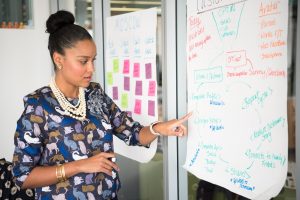Participatory focus group meetings with ethnically diverse students were organised to improve the experiences of ethnically diverse students in our social sciences programmes. It was designed for monthly meetings although we could not always follow it and students led the discussions in terms of topics they wanted to delve into, such as areas of improvement in the department regarding teaching and education and good areas of practice. As exemplified in my paper published in Social Policy and Society, the project had a positive impact on students, demonstrated in their feedback, in terms of the level of engagement with their learning, enhanced focus on career development, improved sense of belonging and wellbeing.
Resources required:
- Time/resources to commit to introducing to extra curricula focus groups.
- Incentives to engage students.
Available evidence of impact:
- Students and staff feeling valued.
- Increase in wellbeing and belonging.
- Community building via students peer to peer in focus groups.
Links to available resources:
- Lim, H-J. (2021) Case Study: Enhancing the Learning Experiences of BAME Students at a University: The University Role, Social Policy and Society
Implementation and potential challenges:
- Follow guideline and project routes such as audit of existing policies or where there are gaps currently.
- Engagement/commitment.
- Funding to incentivise focus group attendance.
- Time to facilitate and potentially invigilate groups.
How to Use:
- Engage BAME students in participatory action methods to ensure their voices are heard.
- Institutions to provide refreshments to facilitate ease of discussion.




